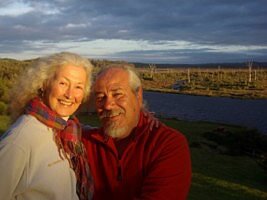Eight years ago, Fernando Claude and his wife Amory felt the urge to leave the big city and find a simpler existence. While many of us harbor this distant dream, Fernando and Amory actually did it--they sold all of their belongings, moved to the remote island of Chiloé off the central coast of Chile, and began their new life. With no running water, no jobs, and only an old military tent for shelter, they found happiness living in harmony with nature. Over the years, they built a sustainable ecolodge so they could share their experience with others. We spoke with Fernando about Chepu Adventures and what travelers can get out of a visit to Chiloé.
Q: When and why did you decide to open the lodge?
 Claude: In our early fifties, my wife and I moved from the big city of Santiago, Chile, to live on Chiloé Island. We didn't know anything about nature--we were city people! We wanted to build "our life project" in Chiloe and live completely self-sufficiently for two years without spending any money at all.
Claude: In our early fifties, my wife and I moved from the big city of Santiago, Chile, to live on Chiloé Island. We didn't know anything about nature--we were city people! We wanted to build "our life project" in Chiloe and live completely self-sufficiently for two years without spending any money at all.
With that goal in mind, we arrived in Chepu and started living in an old military tent, spending our days building a little shack, growing our own vegetables, collecting rainwater, and producing a little electricity with a small wind generator. We used the advice of an old farming manual. What we couldn't produce, we traded for with our neighbors.
During this two-year process, we learned a lot about sustainability, nature, construction, renewable energies, and more. It was a trial-and-error education! Our lives and spirit were reloaded with energy and optimism and the best thing of all is that we began to know and understand nature. When you live in the city, nature is something distant, but when you are able to experience how wonderful it is, you begin to understand and be amazed by it. Once you love nature, you feel the urge to protect it.
For the first time, we felt like we owned our destiny. One day, some tourists requested to rent our kayaks, and they liked the area so much they asked if they could camp on our property. It was then that we decided to set up a small campsite and kayak rental service as a way to earn a little money. In the past eight years, it's grown into a full-fledged lodge.
 Q: What makes your location, Chiloé Island, special?
Q: What makes your location, Chiloé Island, special?
C: In 1960, an earthquake caused the ground to sink a few meters, creating a haunting and beautiful sunken forest in the Chepu River Valley. You can kayak between the logs and tree branches and observe the wildlife that has adapted to this unique ecosystem.
Chiloé is a magical island full of culture, mythology, traditions, and blessed natural beauty. The wooden churches built by the Jesuits were named a World Heritage Site by UNESCO, and you can also find some interesting historic Spanish forts.
Q: What kinds of wildlife can guests expect to see at your hotel?
C: Our place is rich in bird life, with more than 100 different species. It's common to see cute river otters escorting your kayak along the river, as well as other mammals like the coipo, a large semiaquatic rodent. You can find also one of the smallest species of deer walking on our garden, the pudú.
Q: Tell us about your electric kayaks – how are they different from traditional kayaks and what are the benefits?
C: Electric kayaks were an innovation created by bird and mammal watchers. Their electric motor uses deep cycle batteries that are recharged only with wind and solar power, so they do not have any carbon footprint and don't contaminate the water. They are also completely silent, so animals are not scared off. The kayaks have two comfortable seats and you can safely carry photographic equipment.
 Q: How does your business benefit the local community?
Q: How does your business benefit the local community?
C: We always try to have good relations with our neighbors and involve them in tourism activities. We hire local people to work with us and buy local produce as much as possible, such as honey and vegetables. We hire local boaters for bird watching tours and transporting our guests down the river.
Q: What are some of your noteworthy sustainability initiatives?
C: Nature is our main supplier. Our electricity comes from the wind and sun, and our hot water from solar heaters. All of our water comes from the rain and is filtered by the soil. We separate our garbage and compost our organic waste.
We are committed to protecting the environment in all of our activities. Our latest innovation is a computer software program that we designed ourselves to control our use of water and electricity. With this new technology, we can teach our guests and help them understand their impact. We assign them a certain quota of electricity and water for their daily use, and they report how much water and electricity they use on an LED screen in their rooms. For us, technology and sustainability goes hand-in-hand.
 Q: Why is sustainability so important for your hotel?
Q: Why is sustainability so important for your hotel?
C: We have two main reasons. First, we are located in an area with no water supply -- the one and only source of water is rain. Therefore, we must be sustainable in order to have a secure water supply during the dry summer months.
Second, we truly believe that a sustainable way of life is the only way. We share our experience with our guests and show them how much can be saved with very little effort. We are sure that after their visit, many of our guests will continue the sustainable practices they've learned.
Q: Of all of the hotels in the area, what makes Chepu Adventures special?
C: We are in a rural area far from the city, in a place that is still uncrowded and simple. Now that we are becoming more well-known, more people are coming to visit the area, giving our neighbors the chance to start earning income from tourist products and services.
There are so many businesses that talk about sustainability without any meaningful commitment, so we want to be a real example of sustainability in Chile. That is why it is so important for our claims to be backed up by sustainability certifications. Every day, more people come to live our eco-experience. Sustainability is our passion and the desire to live out of the "system" encourages many people to follow our example.



